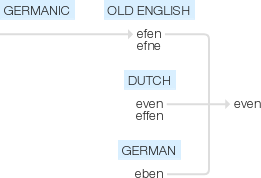Even
Old English efen (adjective), efne (adverb), of Germanic origin; related to Dutch even, effen and German eben .
wiktionary
From Middle English even, from Old English efen, efn, emn(“even, equal, like, level, just, impartial, true”), from Proto-West Germanic *ebn, from Proto-Germanic *ebnaz(“flat, level, even; equal, straight”), from Proto-Indo-European *(h₁)em-no-(“equal, straight; flat, level, even”).
Cognate with West Frisian even(“even”), Low German even(“even”), Dutch even(“even, equal, same”), effen, German eben(“even, flat, level”), Danish jævn(“even, flat, smooth”), Swedish jämn(“even, level, smooth”), Icelandic jafn, jamn(“even, equal”), Old Cornish eun(“equal, right”) (attested in Vocabularium Cornicum eun-hinsic(“iustus, i. e., just”)), Old Breton eun(“equal, right”) (attested in Eutychius Glossary eunt(“aequus, i. e., equal”)), Middle Breton effn, Breton eeun, Sanskrit अम्नस्(amnás, “(adverb) just, just now; at once”).
The verb descends from Middle English evenen, from Old English efnan; the adverb from Middle English evene, from Old English efne.
The traditional proposal connecting the Germanic adjective with the root Proto-Indo-European *h₂eym-, (Latin imāgō(“picture, image, likeness, copy”), Latin aemulus(“competitor, rival”), Sanskrit यमस्(yamás, “pair, twin”)) is problematic from a phonological point of view. [1]
From Middle English even, from Old English ǣfen, from Proto-Germanic *ēbanþs.
Cognate with Dutch avond, Low German Avend, German Abend, Danish aften. See also the related terms eve and evening.
etymonline
even (adj.)
Old English efen "level," also "equal, like; calm, harmonious; equally; quite, fully; namely," from Proto-Germanic *ebna- (source also of Old Saxon eban, Old Frisian even "level, plain, smooth," Dutch even, Old High German eban, German eben, Old Norse jafn, Danish jævn, Gothic ibns). The adverb is Old English efne "exactly, just, likewise." Modern adverbial sense (introducing an extreme case of something more generally implied) seems to have arisen 16c. from use of the word to emphasize identity ("Who, me?" "Even you").
Etymologists are uncertain whether the original sense was "level" or "alike." Used extensively in Old English compounds, with a sense of "fellow, co-" (as in efeneald "of the same age;" Middle English even-sucker "foster-brother"). Of numbers, from 1550s. Sense of "on an equal footing" is from 1630s. Rhyming reduplication phrase even steven is attested from 1866; even break (n.) first recorded 1907. Even-tempered from 1712. To get even with "retaliate upon" is attested by 1833.
even (v.)
Old English efnan "to make even, to make level; liken, compare" (see even (adj.)). Intransitive sense of "become even" is attested from early 13c. Related: Evened; evening.
even (n.)
"end of the day," Old English æfen, Mercian efen, Northumbrian efern (see eve (n.)).
